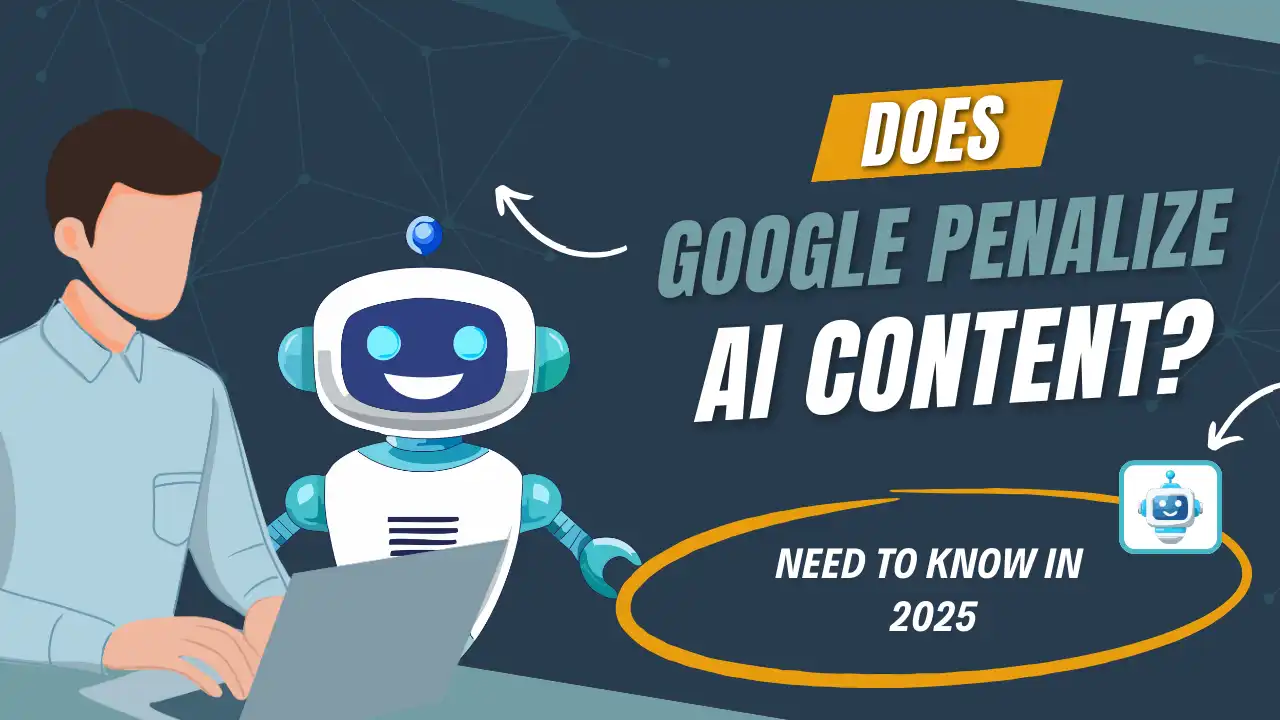Google still emphasizes the quality of the content. They give credit to useful, trustworthy, people-focused content, which shows E-E-A-T (Experience, Expertise, authoritativeness, and trustworthiness), and it makes no difference whether a person or AI tool was used to create this content.
The actual problem is when AI is employed to write low-quality content, duplicate, or even spam due to its ability to scale, its main purpose being to manipulate the search results, which contravenes Google’s spam guidelines.
This blog outlines the Google strategy for 2025, covering the latest changes, key quality considerations, and practical suggestions for the effective use of AI without the risk of penalties.
What is AI Generated Content?
By AI-generated content, we refer to anything that an AI-based system generates rather than a human being. The types of content that are covered by AI-generated content include a significant variety of content, such as:
- Content: Blog posts, articles, product descriptions, social media posts, and chatbot conversations.
- Media: Infographic, illustrations, images, music, and videos.
- Voice: VR and AI assistant voice, narration and voiceover.
- Code: Game, websites and software applications.
- Data: Economic reports, research in the field of science, and weather forecasts.
Artificial intelligence content generators utilize advanced programming with massive training data. The tools can quickly produce vast quantities of output which tends to resemble the tone and structure of text written by a person.
Most content creators are those users who employ AI tools to partially support content creation tasks, including generating ideas and outlines, writing first drafts, and making content search-engine optimized.
How Does Google Treat AI-made Content?
Google will not penalize content on the basis that it is AI-generated. Rather, it is concerned with the quality, originality and relevancy of the content, irrespective of the source of the content.
An important update by Google published in January 2025, Quality Rater Guidelines (QRGs), providing human raters with specific guidelines about AI.
Now content with no or minimal hard work, originality, and added value in which rules apply when all or nearly all the main content is generated by an AI and there is no evidence of serious effort will get the rating of the Lowest. That is how it shows that it is a risky strategy to run any content through an AI tool without putting much human touch and value addition to it. The criteria also focused on finding poor quality paraphrased work.
That is why based on all these facts Google does not penalize AI-generated content. Indefinitely, AI-made content should be up to the standards and not exploited in attaining search value, and it can do exceptionally good in search results.
Google Instructions About AI-Generated Content
Google has recently outlined how it perceives the AI-authored content placed in search results. This matters to individuals who are content creators, and would like their content to appear on Google. The key points of Google Guidance are the following:
1. Quality is the Key
The basic message of Google has not changed, Value and utility are more important than the process of creation. People should be the focus of content created, and not just search engines. This entails concentration on:
- Helpfulness: Does the content meet the search intent of the user? Is it providing some true value, answering the questions directly, or bring knowledge in a new light?
- Reliability: Is the data proper and adequate?
- People-First: Does the material capture the interest, is readable and does not encourage a user to have a negative experience?
2. E-E-A-T is Significant
Google employs a set of standards, namely E-E-A-T (Experience, Expertise, Authoritativeness, Trustworthiness) to evaluate the value of the content. The same goes with the AI-assisted content:
- Experience: Is the material of first hand knowledge or life experience to the topic? This is what AI alone can often have the most difficulty imitating.
- Expertise: Does the material demonstrate extensive competence and expertise in the matter?
- Authoritativeness: Is the writer or site of information considered an authority on the subject?
- Trustworthiness: Is the material correct, non deceptive, safe, and dependable? Are references made? Is source/writer credible?
Content that lacks good E-E-A-T scoring, particularly when that content pertains to Your Money or Your Life (YMYL), will not do well, regardless of whether it is generated by AI or by people
3. Useful Content Prevails
Google is interested in displaying something that would be helpful in real sense. They prefer the reader-centered content instead of high ranking in the search.
4. Artificial Intelligence can be Helpful
Google understands that it can use AI to produce good content. They say:
Not everything created with the help of AI is bad. The use of AI to produce useful items such as sports scores and weather reports is not new.”
It is unacceptable to employ AI with the sole purpose of manipulating Google Ranking and gaining an advantage. It is fine that people make good content using AI to be beneficial to others.
5. Have Clarity in Your Write-Up
Google proposes one to consider the following: who created the content, how it was created, and why. This aids in demonstrating the knowledge in the content.
6. Rules to Follow
Google does not allow using AI to create content in huge amounts, and just to achieve a higher ranking. This can be detected and penalized by them.
Quickly summarizing, Google does not object to AI-generated content as long as it is good and useful.
6 Methods of Ranking Your AI Written Content on Google
These six tips will support your AI content to reach the top of the search engines as well as deliver genuine value to your readers.
1. Helpful Content
A user-friendly content becomes the major aspect in ranking highly in Google. When AI is applied, take care of addressing the actual problem of readers.
Begin with a common question search in your niche. Use AI to collect a full range of information but do not stop there. Do not stop on simple answers. Create a detailed description, instructions by steps, and knowledgeable suggestions.
As an example, when you write about gardening, tell your AI to add the solutions of popular plant diseases and a monthly plant schedule of popular plants.
In all cases, AI- AI-generated content should be fact-checked. Make your details fresh and correct.
And do not forget that Google appreciates the content that really helps customers. The more helpful your AI-generated content becomes, the higher it will rank.
2. Develop the E-E-A-T Principles
The following principles, E-E-A-T (Expertise, Experience, Authoritativeness, Trustworthiness) are important in high ranking content.
- Inject Experience: Include personal stories, case/real-life examples, or any other perspective apparent only to a human specialist. It is essential in the separation of your content.
- Guarantee Expertise & Accuracy: Utilize AI to research or draft, and continually have subject matter specialists checking, fact-checking, and polishing up to make the content accurate and extensive. Make use of established sources.
- Establish Authority & Trust: Keep the content published by author names that are credible and in case of a brand, consider publishing by an established brand name with author bio profile (as an expert in the topic). Be open and truthful. Never use deceptive statements.
E-E-A-T principles may help enhance credibility and ranking of your AI content considerably.
3. Give Your AI Original Ideas
Training your AI on original ideas is essential towards producing unique content.
First of all, you need to brainstorm and come up with original ideas of your topic. What do you have to tell that is not widely available on the Internet?
Tell the AI about your lives or what you have seen. This may cause new ideas on your content.
You might want to consider original research or survey. Apply this data to provide your AI with special information to operate with.
To develop the insights on its own, give your AI information based on your personal time-management experiment to write a productivity article.
Your own contribution would increase your chances of having an AI content that is not competing with the others and placed higher.
4. Set Your Tone with AI
Brand voice will be an essential requirement even when it comes to AI-generated content.
Establish a clear tone of your brand. Is it formal, informal, humorous or technical?
Give the AI examples of your brand voice. This creates a better knowledge of your style.
In case your brand uses humor specifically, teach your AI to add some light jokes or puns where they should be used.
Check and correct AI-generated content regularly to match what is of your brand voice.
It is worth keeping in mind that a coherent voice establishes credibility on behalf of your audience, and it may enhance the interaction of users with your content, which can boost your rank unintentionally.
5. Respond to Research Intent
An understanding of the search intent is what matters when ranking content.
Analyze trending search topic in your niche using AI tools. What do people really need?
Take a look at the variety of search intent informational, navigational, commercial and transactional.
When you search a question such as, “best smartphones,” make sure to instruct your AI to carry comparisons, users reviews and purchasing guides to use informational and commercial intent.
Customise your AI-generated content to be responsive to the most pertinent search intent on your subject.
It should be kept in mind that the content which meets user intent has more chances to rank high on the search.
6. Make Your Content Human
Placing a human touch on the AI-based content may contribute to its attractiveness and efficiency significantly.
Use personal examples, or case studies when necessary. It gives credibility to your piece.
Add quotes or thoughts by real people within your profession. This gives it more depth and credibility.
Think about some analysis or opinion on AI-provided facts and figures on your own.
When reviewing tech, you want your AI to include space where you can insert your experience with using the product, as well as special notes only a person can come up with.
The personal touch will make your piece more interesting and relatable and it can elevate user metrics and in turn help improve rankings.
Final Words – Google Penalizes AI Content?
The ultimate goal of Google is to assist the users with the best, and most reliable information. All of its algorithms and guidelines, such as E-E-A-T and the logic behind recent core updates, are aimed at rewarding the content that meets this mission.
AI provides the tools to create, make more efficient, and adopt new possibilities in content creation. Nonetheless, it is not a shortcut to avoiding the need for expertise, work, and a real emphasis on adding user value.
Using AI to create content without a substantial amount of human review and editing, checking facts, and adding unique perspectives or experiences to it, is a risky solution that heavily opposes Google’s quality expectations. With an emphasis on quality, helpfulness, and E-E-A-T, you are free to use the power of AI to improve your content strategy without getting into trouble with Google.
FAQS – Google Penalizes AI Content?
Q1. Should Google punish artificially intelligent text?
No, it is not like Google automatically penalizes text merely because it was created through AI. The punishment is exacted on the content that infringes Google spam guidelines or does not reach the quality standards (low-quality, unoriginal, unhelpful), not matter how it has been generated.
Q2. Can AI-generated content negatively affect my SEO?
Badly generated AI content (spammy text, very thin, poor, not E-E-A-T) will most definitely negatively impact your SEO. But valuable, high-quality, human-reviewed, and improved AI-assisted content can in fact support your SEO campaigns.
Q3. it possible to get a high position in Google with AI-generated content?
Yes, absolutely. Empirical research and practice demonstrate that AI-aided content can perform and even outperform or match an exclusively text-generated content to the extent that it satisfies Google parameters and selection criteria (helpful, reliable, people-first, E-E-A-T).
Q4. How can I assure my AI-created material is Google-compliant?
Pay attention to the human value addition. Use AI in writing or research, and send over to experts to review, edit, fact-check, and provide unique thoughts, experience and freshness. Make sure that the content has high E-E-A-T signals and is indeed useful to your readers.
Q5. Is it fine to create content with the help of AI entirely?
Although it is technically possible, it is very discouraged and dangerous. Google anticipates human contributions and supervision. AI-only generated content with minimal or no human editing and value-add is unlikely to be original, experienced, and/or deep, and risk violating quality guidelines (or be reported as scaled abuse).
Read More : 10 Ways to Make AI Content Sound More Human
Read More : Why You Need to Make AI Content Sound Human in 2025?



